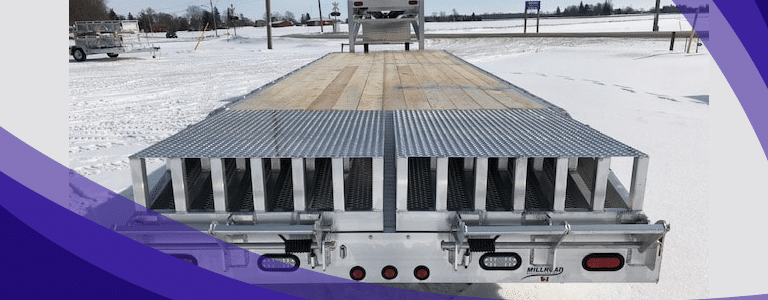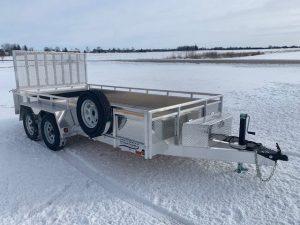
August 18, 2020 Last updated on June 16, 2023 by Bob Fisher Bob Fisher Aluminum Trailers
The winter months may be great for cheer and ambience during the holidays, but cold temperatures, ice, snow and freezing winds aren’t good for your outdoor furniture and equipment. The trailer that works hard for you from spring through fall deserves to be stored properly to make sure it gets through the winter without any damage. If you continue to use your trailer through the winter, you need to take special measures to make it safe on the road. Here are some tips for storing and using custom trailers during the cold weather months.

Before you put your trailer away, you should get it ready for spring. It saves you time when you make repairs over the off-season because you won’t have to wait to use your equipment when the weather warms up. Here are some steps to take before storing your trailer.
Even if you winterize your trailer, plan to spend a day in the spring getting it ready for the new season. You’ll want to inspect the trailer again to determine if any damage was sustained over the winter. You need to check all the parts, especially the tires and electrical elements, to ensure they’re in good working condition. You could have had a family of mice move in over the holidays. Winterizing your trailer prevents many problems, but it’s not a cure-all.
Some industries keep working through the winter. If you’re using your trailer throughout the cold months, it’s important to make sure that it is in good condition. Do a maintenance check of the lights, hitch and tires. Make sure that your towing vehicle is also in good shape. Carry a winter emergency kit in case something happens while you are towing your trailer.
Before you set out with the trailer, check driving conditions. You may need to plan a different route or wait until conditions improve. Driving with a trailer is more hazardous than many people realize. Leave early to allow more time. When you’re on slippery roads, you’ll need to drive slower with a trailer than if the roads were dry. You’ll want to leave more space between you and other drivers too. It takes more time for your vehicle to come to a stop when you’re hauling a trailer. Always wear your seatbelt and follow the rules of the road for safe driving. Caution is the word of the hour when you’re towing a trailer.
Check out our Millroad Manufacturing website for custom trailers that fit your needs. You can upgrade to a new trailer with quality features when your present one wears out. Find the right trailers to do the work you want to accomplish.